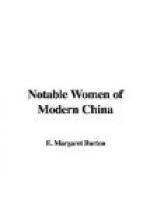Of course little King Eng’s feet were bound, as were the feet of every other little girl of good family. But the binding process had scarcely begun when her father became convinced that this universal and ancient custom was a wrong one. He accordingly made the brave decision, unprecedented in that section of the country, that his daughters should have natural feet, and the bandages were taken off. This proceeding was viewed with great disapproval by his small daughter, for while it freed her from physical pain, her unbound feet were the source of constant comment and ridicule, far more galling to the sensitive child than the tight bandages had been. Now, an ardent advocate of natural feet, she often tells of her trials as a pioneer of the movement in Fuhkien province. “That I have the distinction of being the first girl who did not have her feet bound, is due to no effort of mine,” she says, “for the neighbour women used to say, ‘Rather a nice girl, but those feet!’ ’Rather a bright girl, but those feet,’ and ‘Those feet,’ ‘Those feet’ was all I heard, until I was ashamed to be seen.”
Finally her mother, who did not wholly share her husband’s view of the matter, took advantage of his absence from home, and replaced the bandages. When she would ask, “Can you stand them a little tighter?” the little devotee to the stern mandates of fashion and custom invariably replied, “Yes, mother, a little tighter”; for was she not going to be a lady and not hear “those feet,” “those feet” any more! But when her father came home he had a long and serious talk with his wife about foot-binding, and off came the bandages again. Later the little girl went on a visit to a relative, who was greatly horrified at her large feet, and took it upon herself to bind them again, to the child’s great delight. It was with an immense sense of her importance that she came hobbling home, supported on each side. Her mother was ill in bed at the time, but greatly to King Eng’s disappointment, instead of being pleased, she bade her take the bandages off and burn them, and never replace them. To the child’s plea that people were all saying “those feet,” “those feet,” until she was ashamed to meet any one, Mrs. Hue replied, “Tell them bound-footed girls never enter the emperor’s palace.” “And that,” says Dr. Hue, “put a quietus on ‘those feet,’ and when I learned that all the world did not have bound feet I became more reconciled.”
II
EDUCATION IN CHINA AND AMERICA
When she was old enough, King Eng became a pupil in the Foochow Boarding School for Girls, where she did good work as a student. No musical teaching was given in the school at that time, but King Eng was so eager to learn to play that the wife of one of the missionaries gave her lessons on her own organ. Her ability to play may have been one of the causes which led to the framing of a remarkable and eloquent appeal for the higher education of the Chinese girls, which should include music and English, sent in 1883 by the native pastors of Foochow and vicinity to the General Executive Committee of the Woman’s Foreign Missionary Society of the Methodist Episcopal Church, under whose auspices this school was carried on.




